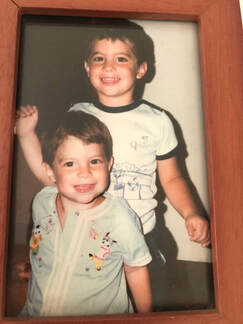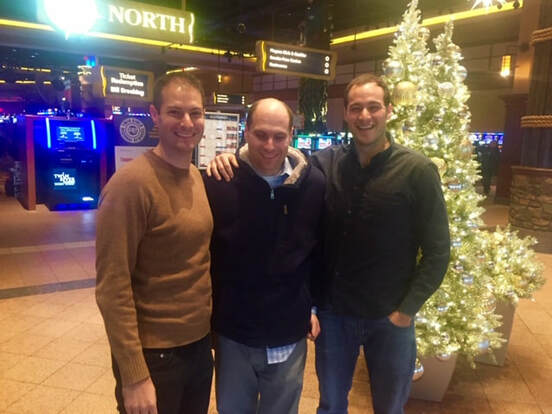
"Investing in Adults with Disabilities: A Personal Story," By Ben Sacks
My older brother Matthew is autistic. When he was two years old, he was slow to develop cognitive skills. My parents knew something was wrong. He was formally diagnosed shortly thereafter, and after a subsequent battery of tests, my parents faced the devastating reality that he would never be able to enjoy an independent life.
Matt grew up in our home until he was eighteen, attending special-needs schools first in Madison, Wisconsin, and then in Providence, Rhode Island.
Matt eventually moved into a state-supported group home with 3-5 other special needs adults and caretakers, where he currently resides. Matt’s vocabulary is limited to 50-60 words, most of which are challenging for him to pronounce. These words are strung together in often repeated basic phrases in an attempt to express more complex thoughts or ideas, for which he lacks the ability. He also suffers from OCD (obsessive compulsive disorder), leading to an uncontrollable focus on finishing every piece of food at each meal and a desire to understand each detail of his weekly schedule, with even the most minute changes causing confusion and public outbursts.
Yet, our family is very fortunate. Despite not being wealthy, we have enjoyed access to a supportive academic community, helping us obtain a formal diagnosis and expert care when Matthew was quite young. According to a 2017 study published in the American Journal of Public Health, researchers at the University of Wisconsin – Madison found that prevalence of an autism diagnosis in young children was highest among socioeconomic groups with high education and income groups, leading researchers to conclude that children from disadvantaged backgrounds often lack access to formal diagnostic tools early in their development. And, according to Autism Speaks, early diagnosis is key – it can improve learning, communication and social skills, as well as underlying brain development.
The advantages of our situation have continued into adulthood. When Matthew turned eighteen, we decided to put him in a group home so that he would get greater socialization and lifetime support. The state of Rhode Island provides care and a high quality of life for Matthew because it has one of the best-funded programs for support of adults with developmental disabilities, allowing our family to surround him with love and support while providing him an opportunity to live a life of relative independence and dignity. Despite his developmental disabilities, he continues to progress – every time I see him, he seems to know a few more words or understand a few more expressions. And through this continued development, we enjoy a relationship filled with love and meaning.
Still, this experience is all too uncommon. After the structural education and support provided by elementary and primary schools, many severely disabled adults lack a natural next step. While normally-functioning young adults enjoy the freedom to make choices after primary schooling – endeavoring in secondary and/or post-secondary education, entering the field of our choosing, finding a life partner, etc. – disabled adults are often left behind. Their development often stagnates during their most formative years. Once-supportive communities may fade, as other children their age move up and out. With this structure removed, families are often left with little choice other than to care for a disabled adult by themselves.
In honor of National Siblings Day, I am reminded of the many ways in which Matthew has enriched my life. He has instilled in me a humility, understanding, and appreciation for the differences among us. He has inspired me to volunteer in my community and join the Board of Directors for Don't Hide It, Flaunt It, an organization dedicated to celebrating and honoring people with both visible and invisible differences.
We also have so much work ahead to improve the quality of care for all autistic adults. According to Autism Speaks, nearly half of 25-year-olds with autism have never held a paying job, a statistic which speaks to their reliance on public programs to achieve a basic quality of life. Too often, the level of debate around government programs is reduced to “getting cut” or “getting funded” for another budgetary cycle by politically divided legislatures. We often fail to remember that these social programs are designed to provide meaning and value to those unable to provide a living wage for themselves without assistance.
As a sibling to a brother like Matt, I have a unique responsibility since I understand him and those like him in a way no one else can. Siblings like me also do not know what it is like not to have a disabled brother or sister. I am therefore grateful to have so much authentic insight and to be part of a community of siblings that can be champions, advocates, and supporters helping those like my brother Matt that need and deserve it.
My older brother Matthew is autistic. When he was two years old, he was slow to develop cognitive skills. My parents knew something was wrong. He was formally diagnosed shortly thereafter, and after a subsequent battery of tests, my parents faced the devastating reality that he would never be able to enjoy an independent life.
Matt grew up in our home until he was eighteen, attending special-needs schools first in Madison, Wisconsin, and then in Providence, Rhode Island.
Matt eventually moved into a state-supported group home with 3-5 other special needs adults and caretakers, where he currently resides. Matt’s vocabulary is limited to 50-60 words, most of which are challenging for him to pronounce. These words are strung together in often repeated basic phrases in an attempt to express more complex thoughts or ideas, for which he lacks the ability. He also suffers from OCD (obsessive compulsive disorder), leading to an uncontrollable focus on finishing every piece of food at each meal and a desire to understand each detail of his weekly schedule, with even the most minute changes causing confusion and public outbursts.
Yet, our family is very fortunate. Despite not being wealthy, we have enjoyed access to a supportive academic community, helping us obtain a formal diagnosis and expert care when Matthew was quite young. According to a 2017 study published in the American Journal of Public Health, researchers at the University of Wisconsin – Madison found that prevalence of an autism diagnosis in young children was highest among socioeconomic groups with high education and income groups, leading researchers to conclude that children from disadvantaged backgrounds often lack access to formal diagnostic tools early in their development. And, according to Autism Speaks, early diagnosis is key – it can improve learning, communication and social skills, as well as underlying brain development.
The advantages of our situation have continued into adulthood. When Matthew turned eighteen, we decided to put him in a group home so that he would get greater socialization and lifetime support. The state of Rhode Island provides care and a high quality of life for Matthew because it has one of the best-funded programs for support of adults with developmental disabilities, allowing our family to surround him with love and support while providing him an opportunity to live a life of relative independence and dignity. Despite his developmental disabilities, he continues to progress – every time I see him, he seems to know a few more words or understand a few more expressions. And through this continued development, we enjoy a relationship filled with love and meaning.
Still, this experience is all too uncommon. After the structural education and support provided by elementary and primary schools, many severely disabled adults lack a natural next step. While normally-functioning young adults enjoy the freedom to make choices after primary schooling – endeavoring in secondary and/or post-secondary education, entering the field of our choosing, finding a life partner, etc. – disabled adults are often left behind. Their development often stagnates during their most formative years. Once-supportive communities may fade, as other children their age move up and out. With this structure removed, families are often left with little choice other than to care for a disabled adult by themselves.
In honor of National Siblings Day, I am reminded of the many ways in which Matthew has enriched my life. He has instilled in me a humility, understanding, and appreciation for the differences among us. He has inspired me to volunteer in my community and join the Board of Directors for Don't Hide It, Flaunt It, an organization dedicated to celebrating and honoring people with both visible and invisible differences.
We also have so much work ahead to improve the quality of care for all autistic adults. According to Autism Speaks, nearly half of 25-year-olds with autism have never held a paying job, a statistic which speaks to their reliance on public programs to achieve a basic quality of life. Too often, the level of debate around government programs is reduced to “getting cut” or “getting funded” for another budgetary cycle by politically divided legislatures. We often fail to remember that these social programs are designed to provide meaning and value to those unable to provide a living wage for themselves without assistance.
As a sibling to a brother like Matt, I have a unique responsibility since I understand him and those like him in a way no one else can. Siblings like me also do not know what it is like not to have a disabled brother or sister. I am therefore grateful to have so much authentic insight and to be part of a community of siblings that can be champions, advocates, and supporters helping those like my brother Matt that need and deserve it.
This story has been published in partnership with the organization, Don't Hide It, Flaunt It.
To read more stories shared in honor of National Siblings Day 2019, please check out our story page here.
Siblings with a Mission is a non-profit, international organization established to serve and support siblings of individuals with special needs. All images are found on Google images and are solely used for educational purposes. The stories and advice provided by Siblings with a Mission are not to be replaced by professional advice and counseling but to be considered as an additional source of support.
To read more stories shared in honor of National Siblings Day 2019, please check out our story page here.
Siblings with a Mission is a non-profit, international organization established to serve and support siblings of individuals with special needs. All images are found on Google images and are solely used for educational purposes. The stories and advice provided by Siblings with a Mission are not to be replaced by professional advice and counseling but to be considered as an additional source of support.

